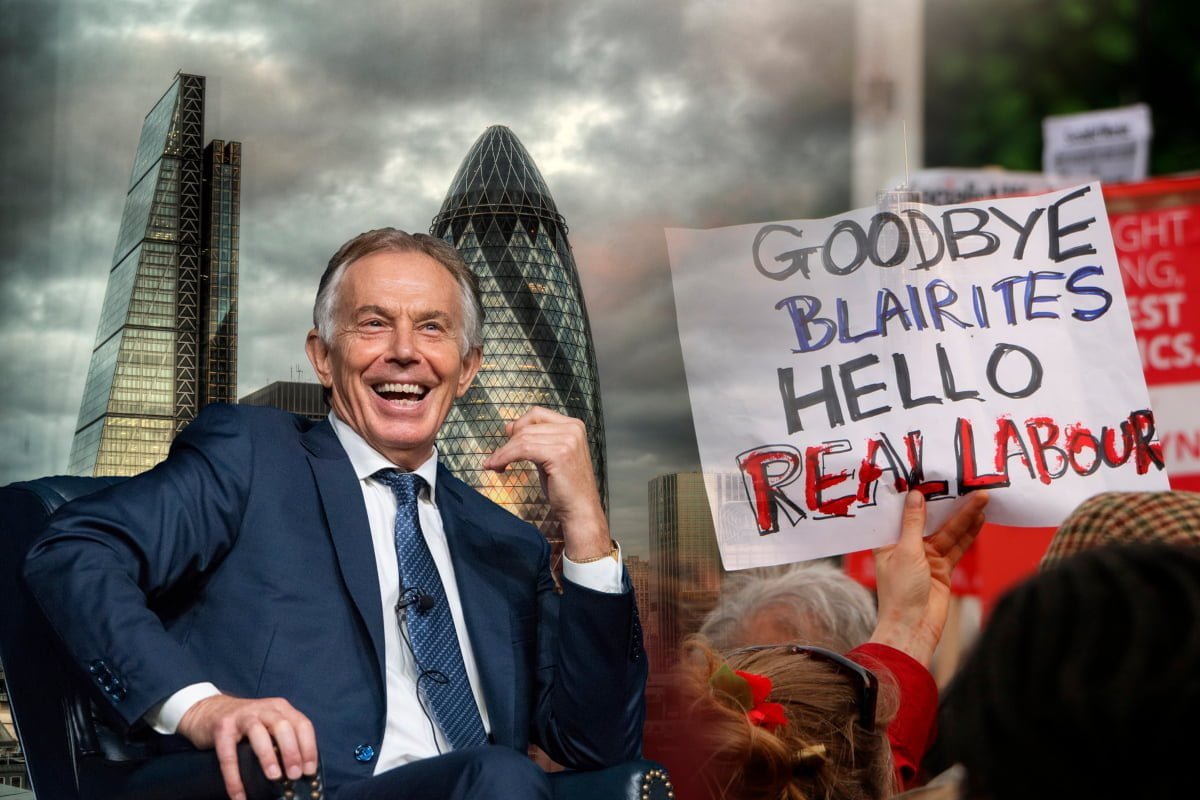Liberal and establishment commentators have had a field day in the wake of Labour’s 2019 election defeat and Keir Starmer’s victory in the recent leadership contest.
With Corbyn gone, we are constantly told, Labour must now return to the Blair days; those of ‘electability’, ‘compromise’ and ‘unity’ as a party, providing ‘credible opposition’ at this time of national emergency.
But these arrogant ‘experts’ have it the wrong way round: it is the forces of Blairism within Labour that are responsible for the party’s December defeat. These same failed ideas, meanwhile, have nothing to offer workers and youth in the face of the daunting coronavirus crisis.
Tony Blair himself has even had the audacity to reemerge from the shadows in recent months in order to gloat. The former Labour leader has been all too present in the media these days, along with many other New Labour-era ghouls.
These has-beens are gleefully looking forward to the potential of wrestling back control of the party from the membership and reversing the Corbyn revolution. Their sickening joy should inspire us, as grassroots members, to redouble our efforts within the party; to organise and resist any slide back to the failed Blairite ‘centre ground’ at all costs.
The Blairite relics in the Parliamentary Labour Party (PLP) must be shown the door. Only then can we complete the Corbyn revolution and fight for the socialist transformation of society.
Back from the grave
Prior to the pandemic and the leadership election result, Blair rose from his crypt to appear at King’s College London, in order to give a speech on the 120th anniversary of the foundation of the Labour Party. This was for an event put on by his own think tank – the humbly titled Tony Blair Institute.
Tony Blair giving a speech at a university while university staff are on strike (admittedly not at KCL due to reading week), to commemorate the founding of the Labour Party, could hardly be more symbolic of his politics and legacy. https://t.co/KeJfhSYxDI
— Fraser McQueen (@FraserJMcQueen) February 20, 2020
His speech is worth some attention, as it contains an insight into what Blair – and the establishment that he represents – would like to see from the Labour Party today, with a new ‘safe pair of hands’ now at the helm.
Predictably, according to Blair, one reason for Labour losing the last election was down to its apparent failure to secure the centre ground, “where Labour has always won”.
This assertion flies in the face of the facts, however. In advance of the election, a sizeable chunk of MPs deserted both the Tories and Labour in an effort to secure this supposedly highly-desired centre ground. These MPs formed The Independent Group for Change, with some later joining the Lib Dems. But all of them were completely wiped out in the election!
With not a single one of these ‘centre ground’ candidates now sitting in Parliament, and with the Lib Dems down a seat, it is clear there is no appetite amongst ordinary people for mealy-mouthed neoliberalism or reheated Blairism. Yet, according to Blair himself, this apparently remains the key to electoral success!
Blair also suggests that to meet the challenges of the 21st century, what is needed is a “new progressive coalition”. He implies that this should include the Liberals also. This is to correct what he terms a “defect from birth”. In other words, he believes that the Labour Party should never have been formed in the first place!
The precursor to the Labour Party – the Labour Representation Committee – was founded in 1900 to give a voice to the working class in Parliament. Prior to this, the labour movement was forced to simply rely on the good intentions of Liberals.
Blair’s mission was always to reconcile this division, by breaking Labour away from the trade unions, abolishing the party’s original – socialist – Clause IV, and generally cosying up to big business. In short, his mission was (and remains) the destruction of the Labour Party as a party for the working class.
Blair concluded his speech by looking to the future: “2020 isn’t 1997 or even 2007. And 2030 will be a revolution different from 2020.” In his view, Labour mustn’t seek to “return to anything”, but rather undergo a head to toe renewal.
We agree with Blair! The world is transforming rapidly. A new, historic world crisis is shaking up society, which is still recovering from the 2008 slump.
In order to fight back against the looming attacks on the working class, Labour cannot return to the pathetic days of Blair’s neoliberalism. Instead, we must continue the head-to-toe renewal that the Corbyn movement began.
Blair’s aims and ambitions
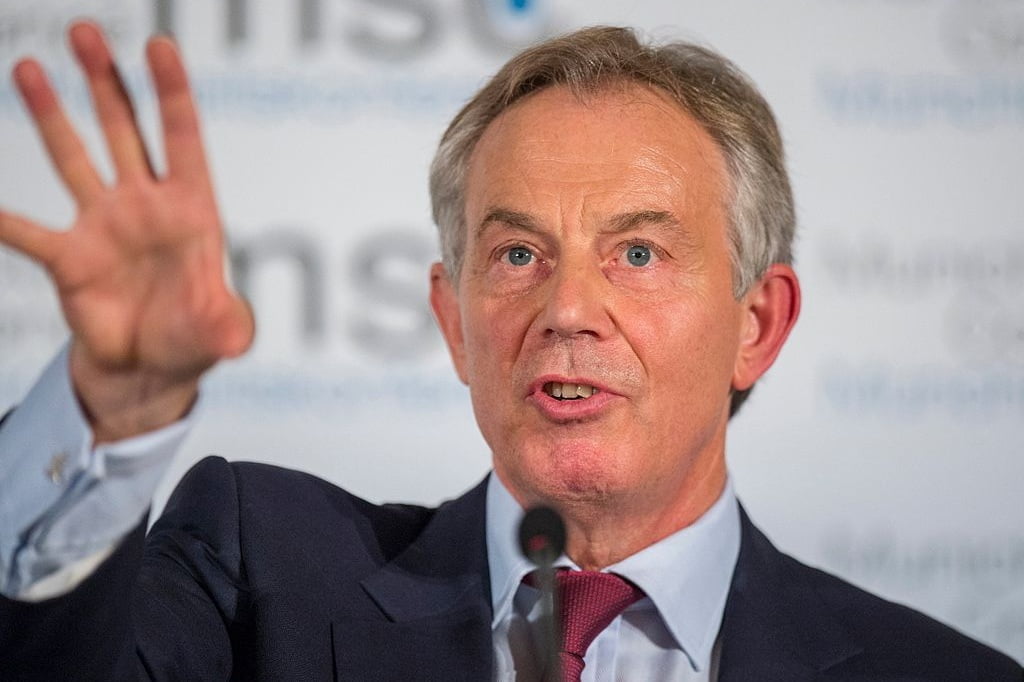 The truth is that neither Blairism, nor any Blair-type leader, can provide a remedy for the problems facing workers and youth today. In fact, New Labour was never intended to solve these problems. Blair gutted the party of internal democracy; subordinated it to US imperialism; and prostituted Labour to the City of London.
The truth is that neither Blairism, nor any Blair-type leader, can provide a remedy for the problems facing workers and youth today. In fact, New Labour was never intended to solve these problems. Blair gutted the party of internal democracy; subordinated it to US imperialism; and prostituted Labour to the City of London.
In the build up to Blair’s 1997 election victory, something was awry. On the first day of the election campaign, the Sun splashed Blair’s face on the front page. “The Sun backs Blair”, read the astonishing title on the cover of this Murdoch-owned rag. There was no vitriolic attack on Blair for being a ‘puppet of unions’ or ‘enemy of business’, as was all-too-familiar for Corbyn.
#OTD 1997. The Sun Backs Blair. pic.twitter.com/chQNxFc80Y
— Tides Of History (@labour_history) March 18, 2017
By this point, it was clear to the billionaire media moguls that Blair posed no threat to their power and authority. Indeed, the New Labour leader had spelt out his commitment to big business in no uncertain terms.
Most notably, Blair had revealed his true colours soon after becoming Labour leader, when he set about scrapping the party’s Clause IV commitment to “common ownership of the means of production, distribution and exchange”. The clichéd, tired arguments about ‘modernisation’ sufficed as window dressing for an all-out approval of Thatcherite policies.
This was nothing less than an attempt to ‘reform’ the Labour Party – a workers’ party grounded in the trade union movement – out of existence. With uncharacteristic candor, Blair admitted as much, saying that: “My vision for Labour is to become as the Liberal Party was in the 19th century.”
Indeed, in the run up to the 1997 general election, Blair was having secret discussions with Lord Ashdown, then leader of the Liberal Democrats, about a potential coalition between the two parties. This conversation even continued after Labour’s landslide victory, with Blair reassuring the Lib Dem leader as the results began coming in thick and fast: “We are still on to sort something out between us. I will be in touch.”
In other words, after 18 years of Tory rule, Blair’s ‘modern’ vision was to turn the clock back a century, to a time where there was no party of the working class.
As a result, Blair earned himself the accolade of being described by Margaret Thatcher as her “greatest achievement”. When Tory grandees are praising you, and when the press barons are patting you on the back, it’s pretty clear that you’re the bad guy.
Blair’s ‘Third Wayism’
After getting into government, Blair declared that he stood not for socialism, but for a brand new ‘Third Way’. Like any dodgy businessman, he did not bother to properly explain what was being sold. Instead, he remained vague, deploying the dark arts of soundbite and spin.
“A dynamic market alongside community values”; “Bridge-building with business to help us all up the ladder”; “A situation more like the Democrats and the Republicans in the US”.
In plain English, the meaning of these vacuous statements reads: an open endorsement of capitalism seasoned with some lip-service to ordinary people; privatising our public services, with the profits siphoned into the pockets of the bosses and bankers; and last, but by no means least, a complete betrayal of the working class, turning Labour into an outright bourgeois party.
This is exactly what happened. New Labour stuck to Tory spending limits, sold off the family silver, and cut corporation tax to below even Thatcherite levels.
Peter Mandelson, Blair’s ‘Prince of Darkness’, neatly summarised New Labour’s ideology: “There is nothing wrong with capitalism with a social conscience or a human face.”
The rub is that if you accept capitalism, then you must also accept the laws and logic that flow from the profit system. The ‘invisible hand’ of the market requires the iron fist of the state to clamp down on the organised working class. And so Blair’s love for the market went hand-in-hand with the continuation of Tory anti-trade union laws.
Blair was conscious of this fact. When asked about a factory shutting in his own constituency, resulting in a loss of 900 jobs, he curtly replied, “You can’t buck the world market”.
The fact of the matter is, we live in a class society where the interests of labour and capital are diametrically opposed. Indeed, the ‘social conscience’ or ‘human face’ is quickly forgotten if it threatens to encroach upon the bosses’ profits. Talk of a ‘Third Way’, therefore, is utterly disingenuous from beginning to end.
Third Wayism at home
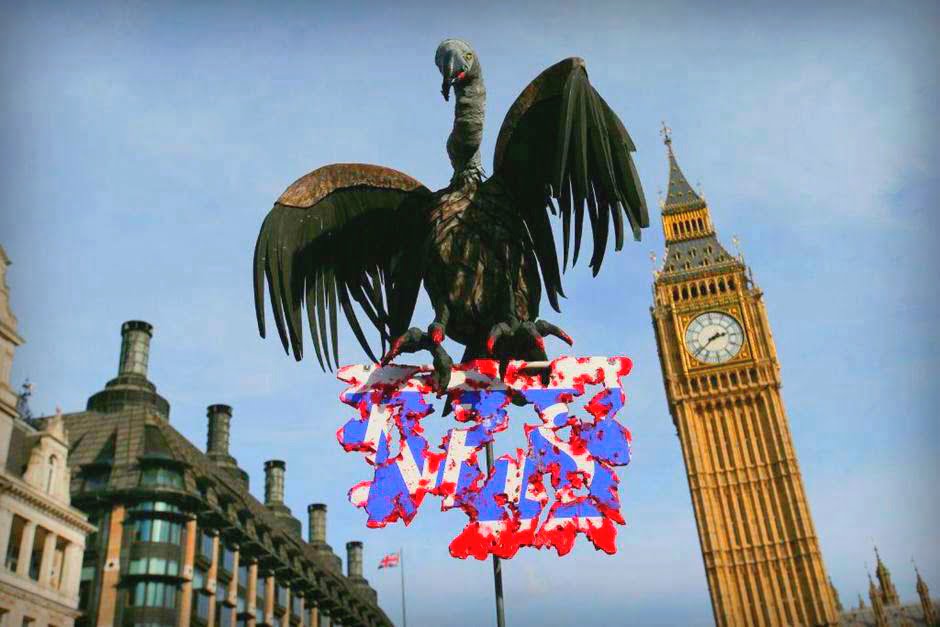 Outsourcing, PFI (private finance initiatives), and the revolving door between big business and government reached new heights under New Labour.
Outsourcing, PFI (private finance initiatives), and the revolving door between big business and government reached new heights under New Labour.
The ‘revolving out’ of health secretaries under Blair is a particularly sinister case in point. Alan Milburn, the health secretary 1999-2003, introduced the NHS foundation trusts as part of the ‘modernisation’ sham. After his resignation, he became an advisor to Bridgepoint Capital, a firm involved in financing NHS privatisation.
Milburn’s successor, Patricia Hewitt, cut 17,000 jobs and public health spending, while welcoming PFI expansion. After her departure from politics, she became special advisor to private equity company Cinven, which bought Bupa’s UK hospitals.
The privatisation of our hard-won NHS was lauded as a stride forward; a more efficient way of running things. Yet any visit to an A&E department speaks against this, exposing how cocooned its advocates are from reality.
If the metric for efficiency was how effective PFI was at lining the pockets of parasitic corporations and ensuring lucrative jobs for health secretaries that ‘revolve out’ into the industry, then it gets top marks. To patients and healthcare workers, however, the chaos and suffering these policies have caused is plain to see.
Tellingly, the Labour leader befriended a myriad of billionaire businessmen. From the ‘Eccelstone affair’ to the cash-for-honours scandal, New Labour was mired in sleaze. Blair and his acolytes had corruption leaking from every pore.
No more ‘beer and sandwiches’
In the same vein as Thatcher, Blair rested on the bankers, financiers and business tycoons. As soon as he became Prime Minister, Blair invited Mrs Thatcher round for tea at Downing Street. At the same time, he warned union leaders that they could expect ‘no favours’.
The trade unions were kept at bay, whilst manufacturing and industry were left to go to the wall. Under Blair, Britain transitioned further and further into a senile, third-rate capitalist economy, no longer based on industry, but on the whims of the City of London and the intrigues of the stock market.
Britain firmly cemented her global reputation as an unproductive rentier economy, resting on speculation and gambling. Gone were the ‘responsible’ capitalists and the far-sighted strategists of capital who thought in centuries and continents. In came the reckless traders and their degenerate political representatives.
Important unions – such as the Fire Brigades Union and RMT rail union – disaffiliated from Labour (or were expelled, in the case of the RMT), citing understandable grievances over cuts, privatisation, and no longer being given a seat at the table.
To add insult to injury, Blair upheld the majority of anti-trade union laws dating back to the time of Thatcher’s declaration of class war on the miners.
“Out with the old and in with the new” – that was Blair’s vulgar maxim as he welcomed the decline of the unions, alongside their diminished influence on the Labour Party and its policies.
Third Wayism and War
The illegal war in Iraq, alongside unbridled support of US imperialist aggression, is what Blair is best remembered for. Over one million Iraqis were slaughtered in the cause of oil and imperialist domination.
Jonathan Powell, Blair’s chief of staff at the time, did not believe that the ‘dodgy dossier’ demonstrated that Saddam posed any threat, ‘let alone an imminent threat’. Powell insisted that the government wasn’t to make that claim. But this was drowned out by the banging of the war drums.
Powell was not the only one that did not believe that Saddam had WMD, or that they could be fired at our isles in the space of 45 minutes. Dr Kelly, a scientist working for the Ministry of Defence, also spoke out about the lies and spin of New Labour. He was bullied and harassed by those banging the drums, however, and ended up taking his own life.
The extraordinary display of the two-million strong anti-war demonstrations across the country emphasised what this really was: an imperialist adventure, in which No. 10 was trailing behind Uncle Sam like a poodle.
These dossiers in fact amounted to ‘the longest suicide note in history’, sowing the seeds of utter contempt towards Blair that we still find amongst workers today. Indeed, these events had a huge impact in undermining and tarnishing establishment politics in Britain altogether.
The main premises of the war have been categorically disproved. War-torn, Iraq was transformed into a jihadi playground, with instability and chaos still present to this day.
Thatcher is famed for securing an eye-watering £42bn arms deal with Saudi Arabia. Blair followed in her footsteps, continuing this disgraceful relationship with the gangsters in Riyadh. The Al-Yamamah arms sales to Saudi Arabia began with Thatcher and ended with Blair.
These Typhoon and Tornado jets are the weaponry used today in the barbaric one-sided war in Yemen. The ramifications of these sales are felt, day in day out, in the bloody war of attrition not only against the Houthis, but the Yemeni masses.
Blair, yet again showing his true allegiances, broke the law to cover his tracks. The fraud investigation into the multi billion-pound relationship between the Saudis and BAE systems was halted. Using woolly language of national interest, alongside the ‘security risk’, he masqueraded the real risk at hand: exposing the charlatan that he is, and the lakes of blood he is responsible for spilling.
In the final analysis, New Labour, in both domestic and foreign policy, was a continuation of Thatcher’s legacy. The reforms that Blair introduced – much hailed by his acolytes in the PLP and admirers in the media – such as the minimum wage and Sure Start centres, were few and far between. And in no way do any of these small gains absolve him of the murderous crimes and reactionary actions that he carried out from the very beginning.
Separating fact from myth
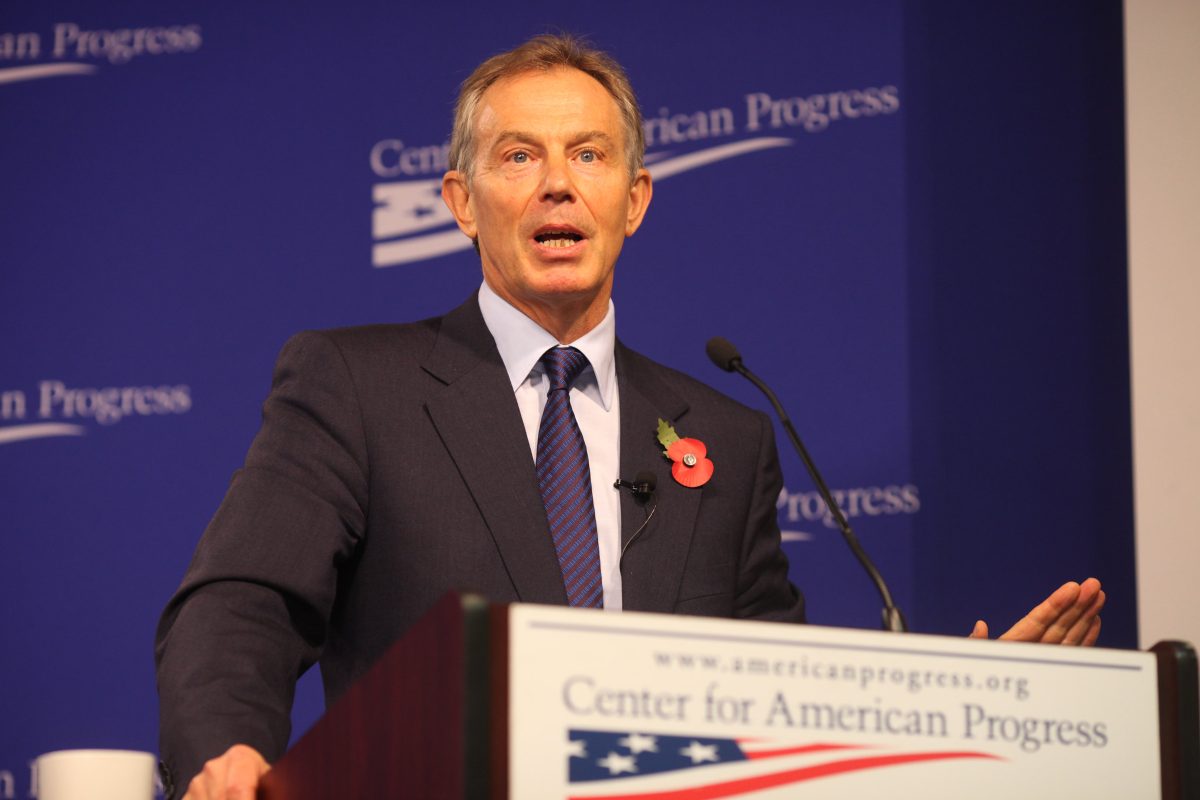 One of the most oft-parroted myths is that Blair was responsible for Labour winning elections. Labour’s lead over the Tories before Blair’s leadership bid was over 30 percent in the polls. By the time of the landslide victory in 1997, this lead had fallen. And from this point onwards, more or less, it continued to fall.
One of the most oft-parroted myths is that Blair was responsible for Labour winning elections. Labour’s lead over the Tories before Blair’s leadership bid was over 30 percent in the polls. By the time of the landslide victory in 1997, this lead had fallen. And from this point onwards, more or less, it continued to fall.
The election win in 1997 demonstrated that the electorate were decisively done with 18 years of cruel Tory rule. Labour won, not because of but in spite of Blair’s politics.
Four years later, Labour’s second term was secured with the lowest turnout on record. Many in the labour movement had realised the ‘new’ turn meant cosying up with their class enemy; others assumed it would take four more years to roll back the crushing impact of Thatcher.
In 2005, nine-and-a-half million people voted for Labour. The number of votes that put Blair in power in May 2005 is fewer than any of the elections fought by Harold Wilson, Jim Callaghan, Neil Kinnock and Jeremy Corbyn. More importantly, one-in-three voters who put Labour in office in 1997 did not turn out to support them in May 2005.
When Blair was elected in 1997, the Labour Party had more than 400,000 members. By 2004, the membership had halved. For many, there was not a modicum of trust left in the sinking New Labour ship.
Blair had no need for grassroots organising, when soft-touch regulation and tax breaks to the press and big-business were gaining him support – not to mention his establishment connections.
Corruption and sleaze reached heights untouched by the likes of John Major and his Tory government. Policy was not made on the floor of the party conference, but in shady backroom deals. Instead, conference simply served as a theatre – but the show went on too long.
Left-wing policies to transform society along socialist lines were jettisoned – and with them, any support Blair had amongst the working class.
The capitalist class were happy with their puppet for a decade. But Blair’s unpopularity – and the resistance of those unions that remained – were posting a problem for the establishment. Their poster boy was rapidly losing his sheen.
Blair stepped aside, just months before a historic crisis of capitalism hit the world. With the global economy in freefall, the ruling class pulled the plug on Labour, realising a Brown government would not be able to carry out the austerity that was necessary to maintain their profits.
The capitalists and the billionaire press had achieved their mission: hollowing out the Labour Party, and thoroughly discrediting it in the process. Make no mistakes: Blair and his unholy apostles were – and continue to be – big business wreckers within the Labour Party!
The election loss
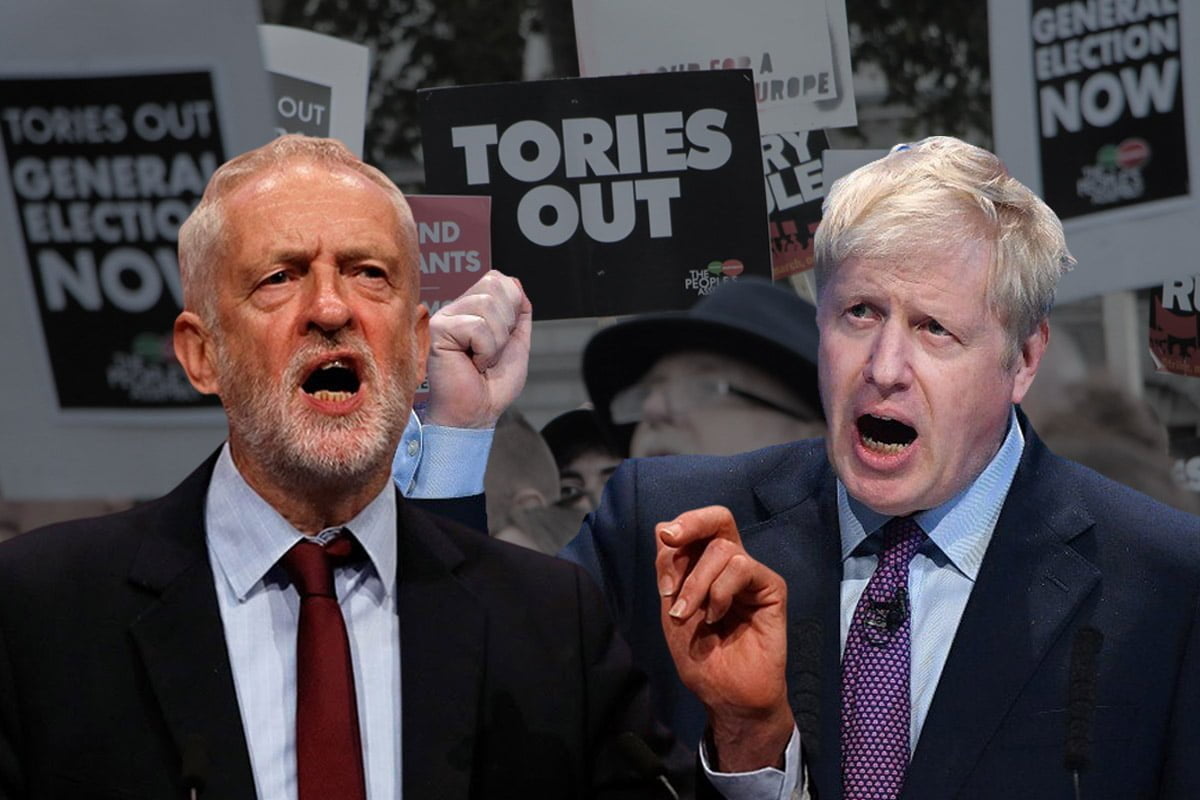 On the evening of 12 December 2019, after the exit poll predicted a ‘thumping’ majority for the Conservative party, Corbyn’s detractors threw themselves in front of television cameras to speak up on the ‘political realities’ of the night.
On the evening of 12 December 2019, after the exit poll predicted a ‘thumping’ majority for the Conservative party, Corbyn’s detractors threw themselves in front of television cameras to speak up on the ‘political realities’ of the night.
Their knee-jerk opportunism was entirely expected – with spin and soundbite filling every two-minute slot. “I want Momentum gone!”, shouted Blairite stalwart Alan Johnson. They all eagerly awaited their two minutes of fame to personally take the axe to the Corbyn project.
Their smirks and smug faces were those of gangsters that have dedicated every fibre of their political career since 2015 to undermining the Corbyn project. Jess Phillips, the self-styled maverick and once hopeful leadership candidate, could not contain her laughter on air – owing, we are assured, to the complexity of human emotion. Paroxysms of hysteria and excitement gripped the fifth column of the Labour Party and the establishment alike.
The stage was set for the right of the party to declare their own ‘end of history’ celebration. Corbyn, and his legacy, is dead and must remain dead, they proclaimed. All that was missing was the admission that they had orchestrated the killing.
Blairites to blame
The election loss falls on the shoulders of these Blairite renegades. From the intense pressure for Labour to move to a Remain position; to peddling smears and slanders against the leadership: they made sure there was no parliamentary unity under Corbyn.
The knives had been out from the very beginning. The recently leaked Labour report into the shenanigans and sabotage of the right-wing bureaucracy at HQ, in this respect, only confirm what grassroots members have suspected and known from the beginning: that there was a cabal of traitors at the top of the party who would do anything to destroy the Corbyn project.
They were disappointed when Owen ‘big pharma’ Smith’s pathetic leadership bid only strengthened Corbyn’s mandate; and were later stunned by the election success in 2017 – literally speechless, in Stephen Kinnock’s case.
Most scandalously, the Labour right wing even organised amongst themselves to actively sabotage the party’s campaign and prevent the election of a left Labour government. No wonder rank-and-file members are now fuming, correctly calling for Blairite heads to roll. We cannot allow these saboteurs to get away with their crimes.
No return to Blairism!
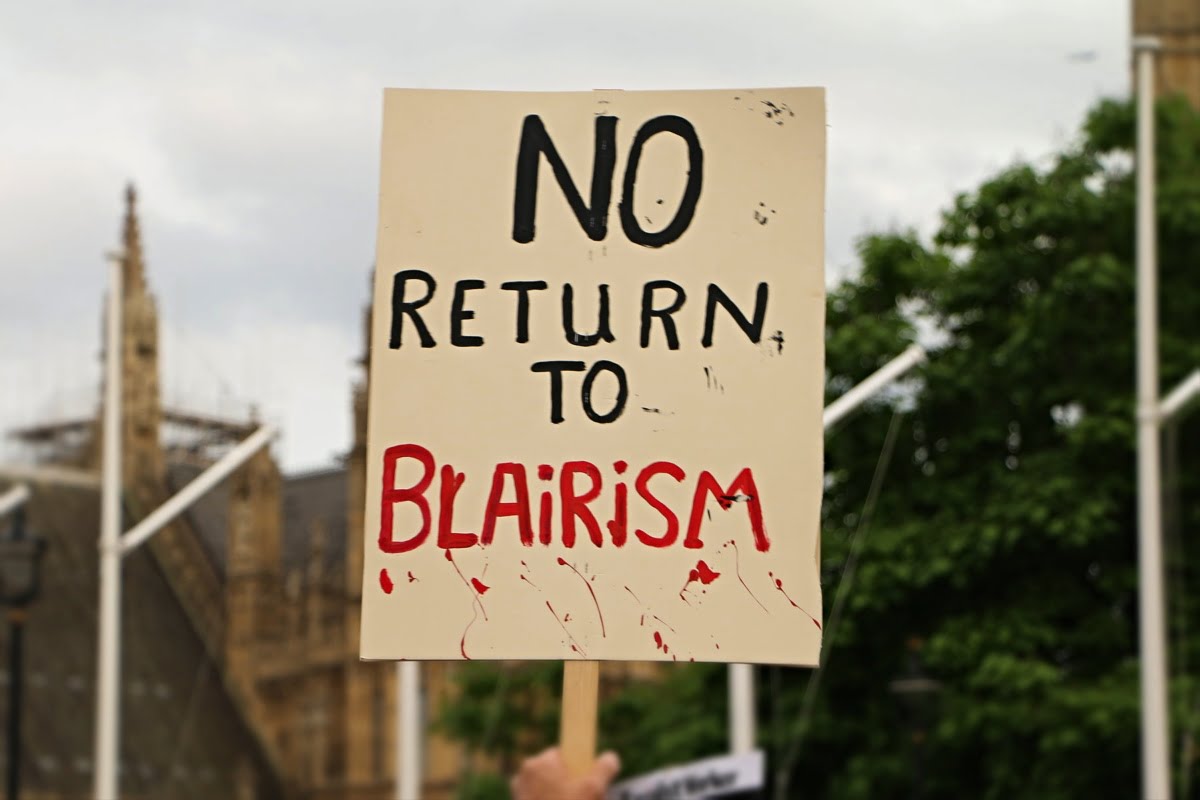 The acolytes of Blair cannot hide their joy that Starmer is now leader of the party. They and the rest of the establishment applaud the return of a so-called ‘credible opposition’ – that is, a Labour Party that does not threaten the interests of big business.
The acolytes of Blair cannot hide their joy that Starmer is now leader of the party. They and the rest of the establishment applaud the return of a so-called ‘credible opposition’ – that is, a Labour Party that does not threaten the interests of big business.
But when Starmer and his right-wing supporters speak so highly of unity, we must be clear that this is unity on their terms. When they speak about electability, they are using a crude euphemism for abandoning socialist policies – just like their Tony – and becoming more pragmatic.
They aim to prove to big business that Labour can be the safest pair of hands. And with Starmer in place, they feel emboldened and ready to take back control of the Labour party.
The machinations are already underway. But there is no appetite for reheated Blairism – within the party or in society at large.
We are in the midst of the deepest crisis in the history of capitalism. The system is in meltdown. Society is facing a return to the 1930s. What people are demanding is an end to austerity. And the only way to carry this out is through transforming society along socialist lines.
When the right-wing hypocrites speak about a ‘broad-church’, this is just window dressing for continuing Blair’s legacy – for keeping the careerists, saboteurs and budding turncoats within the party.
The recent revelations of the leaked report, however, have revealed to Labour’s mass membership that the pernicious role that the Blairites play: that of a Trojan horse, working from within to asphyxiate the initiative and energy of grassroots activists. These right-wing scoundrels work to maintain the capitalist status quo, by wrecking Labour from within.
Build the Marxist tendency
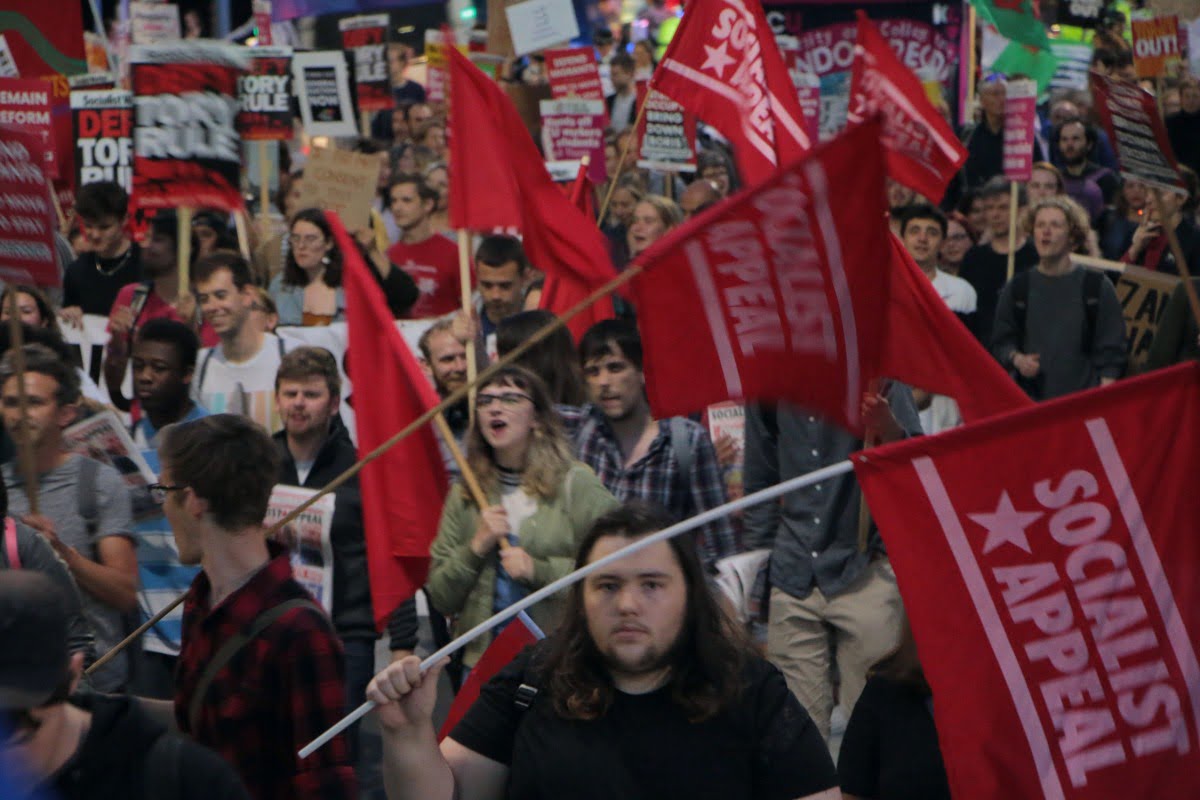 The ‘Third Wayism’ of Blair can provide no solution to the acute problems facing workers and youth today. Crucially, it never could.
The ‘Third Wayism’ of Blair can provide no solution to the acute problems facing workers and youth today. Crucially, it never could.
The unpopularity of Blair himself – permanently tarnished by his reactionary politics – laid the groundwork for the current distrust and feelings of betrayal towards the Labour Party we find today.
The lack of party democracy, meanwhile, has allowed out-of-touch Labour MPs to cradle their jobs as though they were peerages – until they’re nudged to ‘revolve out’, just like Blair, to make a killing in the private sector. This is why we need open selection: to create a new generation of class fighters, who will put the interests of ordinary people above that of their own careers.
We must not let the Labour Party be taken over once again by these careerist creatures. We need a socialist Labour Party, filled with impassioned class warriors, committed to the socialist transformation of society.
Above all, we need to build a strong Marxist tendency inside the labour movement – a tendency of workers and youth, organised around bold socialist policies.
Under capitalism, society is at an impasse. Only socialism can provide a genuine alternative. We need to build the forces of Marxism – in Britain and internationally. We call on you to join us in this urgent task.

